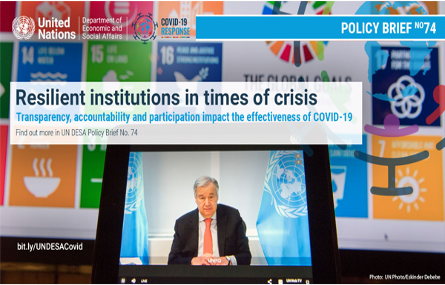National institutions are strongly impacted by the coronavirus (COVID-19). The pandemic has disrupted to varying extents the regular functioning of state institutions, such as parliaments and justice systems, and affected key government functions and processes, undermining the effectiveness of government action. The need to respond quickly and with drastic measures has also created additional risks for institutional processes and organisations. Beyond individual institutions, the pandemic has increasingly affected whole institutional systems and the way public institutions interact with people.
This brief discusses the challenges of the COVID-19 emergency along key dimensions of national institutions highlighted in Sustainable Development Goal 16 (transparency, access to information, accountability and anti-corruption, participation and engagement). It also explores how government institutions and civil society have innovatively responded to ensure that transparent, accountable, responsive and equitable mechanisms continue to govern the functioning of government processes and organizations, thus increasing the resilience of institutions to shocks such as the coronavirus pandemic.
The coronavirus pandemic has created unique challenges for transparency, participation and accountability. National and international actors have responded fast and forcefully to these challenges.
In some countries, accountability institutions, such as supreme audit institutions and access to information and privacy oversight bodies, have been monitoring and disseminating information about the impact of policies and regulations adopted by governments in response to the crisis. Civil society is self-organising and also playing a key monitoring role of government action and proposing innovative solutions - sometimes working collaboratively with governments - to strengthen the resilience of institutions. International organizations and networks are also playing a critical role, collecting examples of innovative practices and supporting countries in their efforts to sustain the essential functions of public institutions through different tools, including online repositories, discussion forums, guidance and knowledge-based products.
Most countries are still striving to limit the spread of the epidemic, manage immediate health risks and mitigate broader economic and social impacts. As countries transition from the immediate response to the crisis to longer-term recovery efforts, it will be critically important to take stock of how the COVID-19 pandemic has affected key dimensions of national institutional systems such as accountability, transparency and participation, in order to prevent reversals of progress on these critical institutional dimensions and to avert longer-term consequences on public institutions and human rights. Together with other key principles embodied in Sustainable Development Goal 16, these institutional dimensions can provide signposts for increasing the resilience of national institutions to external shocks in the future.
File added date: February 2021
Published by: UN DESA/DPIDG
 Welcome to the United Nations
Welcome to the United Nations
